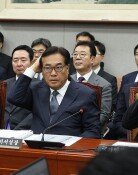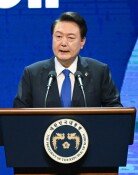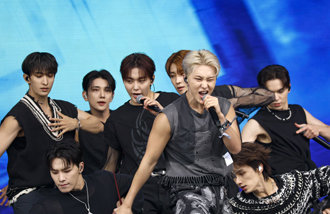Futile efforts repeat every 5 years
Lets start protest rallies, wearing black T-shirt.
We should demonstrate the power of ajumma (middle-aged married women).
Schools and mothers got furious with anger and despair as a revised plan on the college admissions system was announced on Tuesday and Wednesday. The college admissions system was set to dramatically change, with the electives in the College Scholastic Aptitude Test in which test-takers choose two different difficulty levels (types A and B) of Korean, English and mathematics tests, being scrapped just one year after it was introduced this year. As the admission system changes every time a new government takes power, schools and parents seem to be sick and tired of repeated changes, apart from the elements of the changes. The self-regulatory private high school policy, which was introduced with the grandiose aim of reviving the unique philosophy of foundation of private schools, has effectively entered a phase for revocation.
Policies introduced during the previous Lee Myung-bak administration is being reverted to the past systems before their introduction. Korea Development Bank with 200 trillion won (180 billion U.S. dollars) in total assets, and Korea Finance Corp. were split into two and are now being merged anew four years after their separation. When Korea Development Bank was split in 2009, the government planned to privatize one of the units, and let the other take charge in policy financing, but the plan has been reverted to square one. Even back then, many critics raised questions whether privatization can be implemented seamlessly during an era of financial crisis. As the government sought to split and merge large state-run corporations without making any achievements, it has effectively ended up wasting massive costs and energy.
Resource diplomacy that the Lee administration had ambitiously pursued already ended in failure. Blankly vowing to develop resources and energy overseas, the administration left state-run corporations hugely indebted, but made little practical achievements. Lee Sang-deuk, former Saenuri Party lawmaker and President Lees elder brother, and Park Young-joon, former vice minister for knowledge economy who spearhead resource diplomacy, are serving jail terms due to corruptions. The Bogeumjari housing project for the working class (apartments for public sales) have been halted, and are set to be replaced with Haengbok (happiness) housing, a rental home project.
Economic growth rate is going to rise. As much as 250 billion won (225 million dollars) was spent to split Korea Development Bank and Korea Finance Corp., while the project to develop the National English Aptitude Test (NEAT) costs 42.6 billion won (38.4 million dollars). The four-river restoration project costs 22 trillion won (19.8 billion dollars), and if the dammed reservoirs are to be dismantled as some in the government demand, it will cost huge sums of money all over again. All these will add to economic growth rate. Gross Domestic Product increases even when buildings and roads are reconstructed after an earthquake. This is incompatibility of economic growth that has nothing to do with quality of life.
The four-river restoration project is the biggest fiasco of all. (If the results of inspection) is truth, (the previous government) effectively told a lie to the public, said Lee Jung-hyun, senior presidential press secretary. He made remarks by calling a press briefing by himself, asking reporters to quote him, an act that was unusual per se. Seeing him, many people would have recalled remarks by Rep. Park Geun-hye of the then Grand National Party five years ago. I was cheated and you people were also cheated. She made the remarks when she strongly condemned President Lee and the partys leadership, after pro-Park lawmakers were dropped en masse in the partys nomination of candidates for the2008 general elections.
When competing each other at the presidential primary of the party, one became the president and the other remained at the party, the two were hardly compatible with each other. It would be fair to say that they have a river of distrust dividing the two, rather than that they have very different personal characters. For this reason, the pro-Park faction would blast whenever then President Lee introduced new figures such as Chung Un-chan and Kim Tae-hyo, saying that President Lee seeks to nurture another presidential candidate in lieu of Park. It remains to be seen how distrust in Lee held by Park, who was effectively an opposition party within the ruling party, will be projected during some four-plus years of the Park administration.
Five years ago, Lee was also engrossed in efforts to delete the traces of the previous government. The Lee administration ousted heads of public organizations appointed by the previous administration in droves, and tried to halt construction of Sejong administrative city that was well underway. While serving as Public Administration and Security Minister Won Se-hoon, former chief of the National Intelligence Service, tried to liquidate the previous government so thoroughly that he even instructed the ministry to not use terms used during the Roh Moo-hyun administration. At that time when they had strong grip in power, they would have never expected that they would face a similar fate five years later.
Damage that is done when a new administration seeks to judge the previous government before history judges is collapse of social trust. It is because even when administrations are replaced, those who make and implement policies are still the government of Korea and its civil servants. How would the public trust a government that says one thing now and says quite another next time? If the Park administration seeks to prevent policies from being discarded and reverted anew five years from now, it should thoroughly agonize from a long-term perspective.







